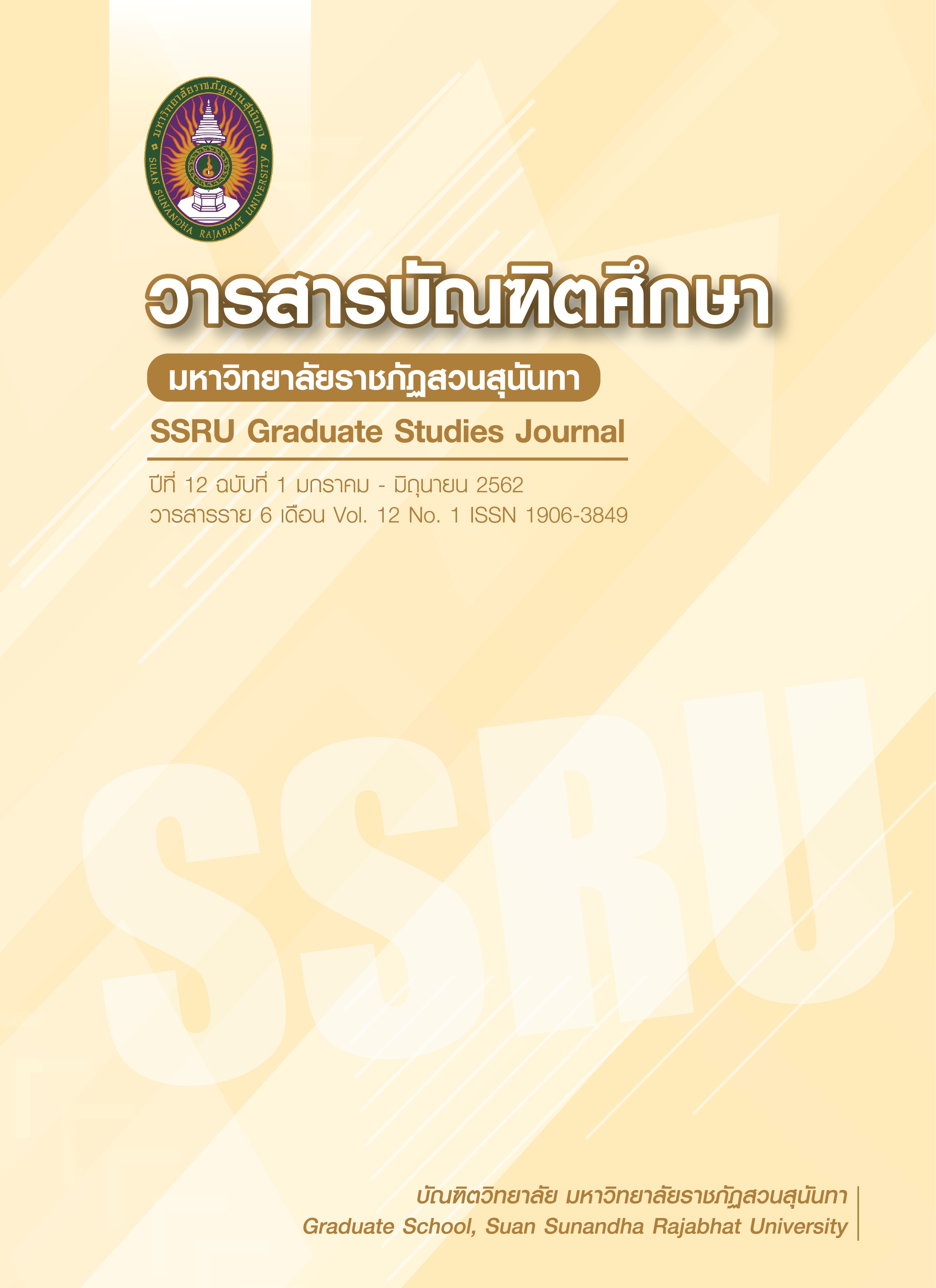DEVELOPMENT OF THE EXPERIENTIAL LEARNING ACTIVITIES FOR ENHANCING THE INTELLIGENCE FRAMEWORK OF IN STUDENTS IN THE HIGH VOCATIONAL CERTIFICATE PROGRAMS
Main Article Content
Abstract
The objective of this study was to develop the experiential learning activities used to enhance an intelligence framework of students in the high vocational certificate programs. This study also aimed to compared the results of the developed experiential learning activities by considering at the average scores of the experimental group before and after participating in the activities, and the average scores of the control group who did not participate in the activities and the experimental group. The sample consisted of 67 volunteer students in the high vocational certificate programs of the Bangpakong Industrial and Community Education College, Chachoengsao Province. The research instruments included the experienced learning activities and the scales of intelligence. Data were analyzed by using t- test and one-way ANOVA
The results were as follows:
1. The Experiential learning activities were highly suitable for enhancing the intelligence framework of the students;
2. The average score of intelligence that the experimental group gained after their participation was found to be higher than the average score they gained before their participation, at a .01 level of statistical significance (p< .01); and
3. The average score of intelligence of the experimental group was found to be higher than that of the control who did not participate in the activities, at a .01 level of statistical significance (p< .01).
In conclusion, the experiential learning activities which was developed could be used to enhance the intelligence framework of the students in the high vocational certificate programs.
Article Details
References
นงนุช เสือพูมี, วัลทณี นาคศรีสังข์ และประไพพิศ สิงหเสม. (2560). การจัดการเรียนรู้แบบประสบการณ์ ทางการพยาบาล. วารสารพยาบาลกระทรวงสาธารณสุข, 27(1), 12-21.
ปริญญา มีสุข. (2559). ปัจจัยที่ส่งผลต่อการตัดสินใจออกกลางคันของนักเรียนอาชีวศึกษา เขตภาคกลาง 1. วารสารบัณฑิตศึกษา มหาวิทยาลัยราชภัฏวไลยอลงกรณ์ ในพระบรมราชูปถัมภ์, 10(3), 72-83.
พฤฒิไกร ไกรพิพัฒน์ และวรเดช จันทรศร. (2559). การพัฒนาพฤติกรรมเชิงบวกของสมาชิกสถาบันอาชีวศึกษา: กรณีศึกษาสถาบันเทคโนโลยีช่างกลปทุมวัน และมหาวิทยาลัยราชมงคลภาคตะวันออก วิทยาเขต อุเทนถวาย. วารสารวิชาการมหาวิทยาลัยอีสเทิร์นเอเชีย, 7(2), 368 - 379.
มงคลชัย สมอุดร. (2560). คู่มือรูปแบบการจัดการศึกษาของสถานศึกษาอาชีวศึกษา. กรุงเทพฯ: สำนักงาน คณะกรรมการการอาชีวศึกษา กระทรวงศึกษาธิการ.
วิริยะ ผดาศรี ปริญญา เรืองทิพย์ และกนก พานทอง. (2560). การพัฒนาความฉลาดทางอารมณ์และ ความฉลาดทางสังคม ของนักเรียนอาชีวศึกษาโดยใช้โปรแกรมฝึกทักษะชีวิต. วารสารวิจัย มหาวิทยาลัยเวสเทิร์น มนุษยศาสตร์และสังคมศาสตร์, 3(3), 79-94.
สยามรัฐ. (2556). “ทวิภาคี” กู้สถานการณ์อาชีวะ. วันที่สืบค้นข้อมูล 23 ธันวาคม 2560, เข้าถึงได้ http://www.siamrath.co.th/web/?q=ทวิภาคีกู้สถานการณ์อาชีวะ.
สำนักงานกองทุนสนับสนุนส่งเสริมสุขภาพ. (2559). ขับเคลื่อนการศึกษาไทยสู่ ไทยแลนด์ 4.0. วันที่สืบค้น ข้อมูล 16 กันยายน 2560, เข้าถึงได้จาก http://www.thaihealth.or.th/Content/33499-ขับเคลื่อนการศึกษา ไทยสู่%20ไทยแลนด์%204.0.html.
สิรินาถ ศรีอนันต์ และนิธิดา อดิภัทรนันท์. (2560). การใช้การเรียนรู้ภาษาแบบประสบการณ์เพื่อพัฒนา ความสามารถในการฟัง พูด ภาษาอังกฤษและความมั่นใจในตนเองของนักเรียนชั้นประถมศึกษา ปีที่ 3. วารสารพิฆเนศวร์สาร, 13(1), 85-96.
อดุลย์ วังศรีคูณ. (2557). การศึกษาไทยในศตวรรษที่21: ผลผลิตและแนวทางการพัฒนา. วารสารมนุษยศาสตร์ และสังคมศาสตร์ บัณฑิตวิทยาลัย มหาวิทยาลัยราชภัฏพิบูลสงคราม, 8(1), 1-16.
Baker, J. L. (2017). Growth Mindset and Its Effect on Math Achievement. Capstone Projects and Master's Theses.
Buckley, P., & Doyle, E. (2016). Gamification and student motivation. Interactive Learning Environments, 24(6), 1162-1175.
Domjan, M. (2014). The principles of learning and behavior. Canada: Nelson Education.
Dweck, C. (2015). Carol Dweck revisits the growth mindset. Education Week, 35(5), 20-24.
Dweck, C. S. (2009). Mindsets: Developing talent through a growth mindset. Olympic Coach, 21(1), 4-7.
Edmonds, W. A., & Kennedy, T. D. (2017). An applied guide to research designs: Quantitative, qualitative, and mixed methods. The United States of America: SAGE Publications.
Gardner, H. (2011). Frames of mind: The theory of multiple intelligences. New York: Basic books.
Goel, D. and P. Vijay. (2017). ECHNICAL AND VOCATIONAL EDUCATION AND TRAINING (TVET) SYSTEM\IN INDIA FOR SUSTAINABLE DEVELOPMENT. Retrieved from http://www.unevoc.unesco.org/up/India_Country_Paper.pdf.
Heller, 2018, 7-8 Heller, H. (2018). The birth of capitalism: A 21st century perspective. London: Pluto Press.
Honey, P., & Mumford, A. (1992). The manual of learning styles (2nd ed.). Maidenhead, K: PeterHoney and Alan Mumford.
Judd, F. (2017). Growth Mindset and Adult Learners in Higher Education. Paper presented at the Global Conference on Education and Research (GLOCER 2017).
Kolb, D. A. (1984). Experiential learning: Experience as the source of learning and development. Englewood Cliff, New Jersey: Pretice-Hall.
Kolb, D. A. (2014). Experiential learning: Experience as the source of learning and development. New Jersey: FT press.
Konak, A., Clark, T. K., & Nasereddin, M. (2014). Using Kolb's Experiential Learning Cycle to improve student learning in virtual computer laboratories. Computers & Education, 72, 11-22.
Manolis, C., Burns, D. J., Assudani, R., & Chinta, R. (2013). Assessing experiential learning styles: A methodological reconstruction and validation of the Kolb Learning Style Inventory. Learning and Individual Differences, 23, 44-52.
Martin, J. (2018). Profiting from multiple intelligences in the workplace. United Kingdom: Crown House Publishing Limited.
Murphy, M. C., & Dweck, C. S. (2016). Mindsets shape consumer behavior. Journal of Consumer Psychology, 26(1), 127-136.
Pallant, J. (2013). SPSS survival manual. McGraw-Hill Education (United Kingdom).
Privitera, G. J. (2011). Statistics for the behavioral sciences. The United States of America: Sage.
Rodkin, P. C., Ryan, A. M., Jamison, R., & Wilson, T. (2013). Social goals, social behavior, and social status in middle childhood. Developmental Psychology, 49(6), 1139 –1150.


